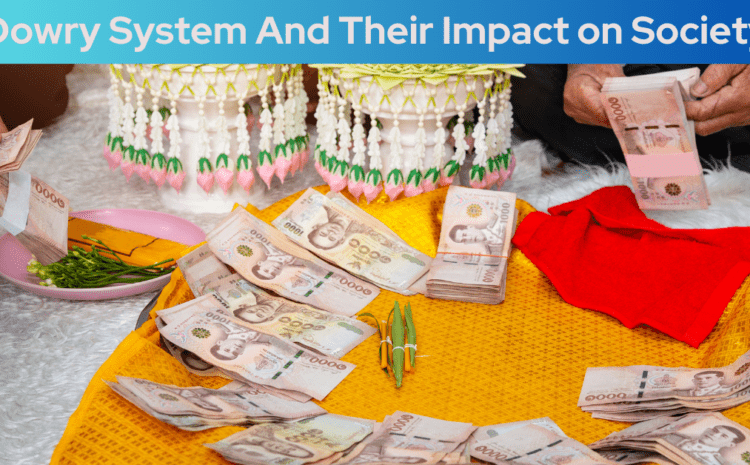
Introduction to Dowry System
The dowry system in India, a deeply entrenched socio-cultural practice, involves the transfer of parental property, wealth, or valuable gifts from the bride’s family to the groom’s family upon marriage. Historically, the practice was intended to assist newlyweds in establishing their household and securing the bride’s future. However, over time, this custom has evolved, often contributing to societal ills and legal disputes.
Rationale behind Dowry System
We clarify that Dowry is a Social Evil and in any form it is condemned by us. However considering the bais on which it was evolved in Indian culture, there could have been some benefits attributed to this system. While widely criticized, certain advantages of the dowry system are posited by some, though they are overshadowed by its adverse effects due to the unreasonable demands ensued by the violence against women. The advantages can be counted only if dowry was not demanded by the groom, but given as a gift to the bride according to the affordability and financial status of her parents
Financial Security for the Bride
The provision of dowry can ensure a measure of financial security for the bride, serving as a safety net in times of economic hardship. It ensures that the bride has assets or monetary resources that can support her in case of future financial difficulties, thereby potentially providing her with a form of economic independence. This is possible only when the bride has a total control over the security that she has received.
Marriage Stability
Proponents argue that dowry contributes to marital stability by creating a financial bond between the families, which encourages the groom’s family to treat the bride well due to the substantial financial investment from her family. This financial interdependence is believed to foster goodwill and better treatment of the bride within the marital household. When the economic and social status of both the families are in par with each other and the bride’s family is not put into debt or bankruptsy or any kind of financial distress due to sharing of wealth, the stability of the marriage can happen. Nevertheless there are divorces and separations do occur in the marriages where dowry was exchanged.
Also Read: – Disadvantages of Mutual Consent Divorce
Social Status
In certain communities, dowry is perceived as a means to elevate social status. A substantial dowry can reflect the economic standing and social prestige of the bride’s family, enhancing their reputation within the community. This practice, while controversial, is seen by some as a method of social stratification and status signaling. In an attempt to do that the parents are considering marriage as a financial transaction and a platform to show off their status, whereas the emotional and social well being of their daughters is often neglected.
Traditional and Cultural Significance
Dowry practices are often deeply rooted in tradition and cultural customs. For many, it is an essential part of matrimonial rituals that have been passed down through generations, making it a culturally significant practice. The exchange of dowry is seen as part of the ceremonial rites that solemnize the marital bond, adhering to longstanding cultural norms. Our society has evolved to prohibit Sati system, accept remarriage of widows, etc through education and awareness. The efforts made by the State alone are not enough to eradicate the Dowry system, participation of every household to refuse to receive, give, demand, boast about it and enjoy the benefits of dowry.
Disadvantages of Dowry System
The disadvantages and detrimental effects of the dowry system significantly outweigh its perceived benefits:
Financial Burden on the Bride’s Family
The dowry system imposes an enormous financial burden on the bride’s family, often leading to indebtedness and economic hardship. Families frequently sell property or take loans to meet dowry demands, exacerbating their financial strain. This economic pressure can lead to severe financial distress and long-term economic repercussions for the bride’s family.
Gender Discrimination
Dowry perpetuates gender discrimination by treating women as financial liabilities. The practice reinforces the notion that daughters are less desirable than sons, contributing to gender inequality and biased societal attitudes. This discrimination manifests in various forms, including female foeticide, preferential treatment of male children and neglect of female children’s education and well-being.
Domestic Violence and Dowry Deaths
The dowry system is a significant factor in domestic violence and dowry deaths. Women who bring insufficient dowries are often subjected to harassment, abuse, and even murder by their in-laws. The National Crime Records Bureau (NCRB) reports numerous cases of dowry-related violence annually.
In the case of Bhoora Singh v. State of Uttar Pradesh, the court held that the deceased, before being set on fire by her in-laws, had written a letter to her father about the ill-treatment and threats due to dowry non-fulfillment, constituting an offence under Section 4 of the Dowry Prohibition Act, 1961 (1993 Cri LJ 2636 All).
Marriage Delays and Unfulfilled Marriages
The inability to meet dowry demands can delay marriages or result in women remaining unmarried. This issue is particularly prevalent in economically weaker sections, where families struggle to accumulate the required dowry. The social stigma attached to dowry can also lead to women remaining unmarried, facing social exclusion and psychological distress.
Social and Psychological Impact
The pressure of dowry affects the mental and emotional well-being of both the bride and her family. It creates anxiety, stress, and a sense of inadequacy, leading to adverse psychological impacts. The continuous demands and associated harassment can lead to severe mental health issues for the bride, including depression and suicidal tendencies.
Also Check: – Divorce Lawyer in Bangalore
Impact on Society and Culture
Social Inequality
The dowry system exacerbates social inequality by widening the economic gap between families. It privileges wealthier families who can afford large dowries, while poorer families struggle, leading to further societal division. This economic disparity reinforces the socio-economic hierarchy, perpetuating systemic inequities.
Gender Imbalance
The preference for sons, driven partly by dowry expectations, contributes to gender imbalance. Female foeticide and infanticide are tragic consequences of this societal bias, resulting in skewed sex ratios. This gender imbalance has long-term demographic consequences, including a surplus of males and the social challenges that accompany it.
Erosion of Values
The dowry system undermines the values of marriage based on mutual respect and love. It reduces marriage to a financial transaction, eroding the sanctity of marital relationships and family values. This commodification of marriage detracts from the intrinsic value of matrimonial bonds and promotes materialistic attitudes towards relationships.
Legal and Ethical Perspectives
Legal Provisions
The Indian government has implemented several laws to combat the dowry system, including:
- Dowry Prohibition Act, 1961: This Act criminalizes the giving, taking, or demanding of dowry. Violators can face imprisonment and fines. In Pandurang Shivram Kawathkar v. State of Maharashtra, the Supreme Court stated that the mere demand of dowry before marriage is an offence under the Dowry Prohibition Act, 1961 (2001 Cr LJ 2792 (SC)).
- Section 304B of the Indian Penal Code (IPC) (Sec 80 of Bharatiya Nyaya Sanhitha, 2023): This section deals with dowry deaths, prescribing severe punishment for those responsible. In Vemuri Venkateshwara Rao v. State of Andhra Pradesh, the court laid down guidelines for establishing an offence under Section 304B, including the need for a demand for dowry, harassment by the accused, and the death of the woman under unnatural circumstances within seven years of marriage (1992 Cri. LJ. 563 A.P).
- Section 498A of the IPC (Sec 85 of Bharatiya Nyaya Sanhitha, 2023): This provision addresses cruelty by husbands or in-laws, including dowry-related harassment. In Bhoora Singh v. State, it was held that the husband and in-laws subjected the wife to cruelty for bringing insufficient dowry and ultimately burned her, resulting in a conviction under Section 498A of IPC (1993 Cri. LJ 2636 All).
Despite these legal provisions, enforcement remains a challenge. The societal acceptance of dowry and the reluctance of victims to come forward due to fear of social stigma and reprisal hinder effective legal redress.
Ethical Considerations
Ethically, the dowry system is viewed as a violation of human rights and dignity. It treats women as commodities, undermining their autonomy and worth. The ethical argument against dowry is grounded in principles of equality, justice, and respect for human dignity.
The practice contravenes the fundamental human rights principles enshrined in various international human rights instruments, including the Convention on the Elimination of All Forms of Discrimination Against Women (CEDAW).
Also Read: – Mediation in divorce cases in india
Conclusion
The dowry system in India, while having a few perceived advantages, predominantly brings about severe disadvantages and detrimental impacts on individuals and society. It imposes financial burdens, fosters gender discrimination, and leads to domestic violence and dowry deaths. Socially, it perpetuates inequality and erodes cultural values. Legally, while there are measures in place to combat the practice, effective enforcement is lacking.
To eradicate the dowry system, a multifaceted approach is needed, involving legal enforcement, public awareness, and a shift in societal attitudes. Education and empowerment of women, along with stringent legal actions, can help in mitigating the adverse effects of this practice. The eradication of the dowry system requires concerted efforts from all societal stakeholders, including government agencies, civil society, and the judiciary.
Ultimately, societal change is essential to eliminate the dowry system and promote gender equality and justice in India. This change must be underpinned by a collective commitment to uphold the dignity and rights of women, ensuring that marriage is based on mutual respect and love rather than financial transactions.

Advocate Kiran S R – A highly skilled, passionate, dedicated advocate, with vast wealth of knowledge, professionalism, ethical approach and expert skills. One of the sharpest legal mindset brings the best principles of legal practice to the forefront. A qualified Engineer turned Advocate. His passion, dedication and vision to help and assist his clients achieve the best results is his driving force.

